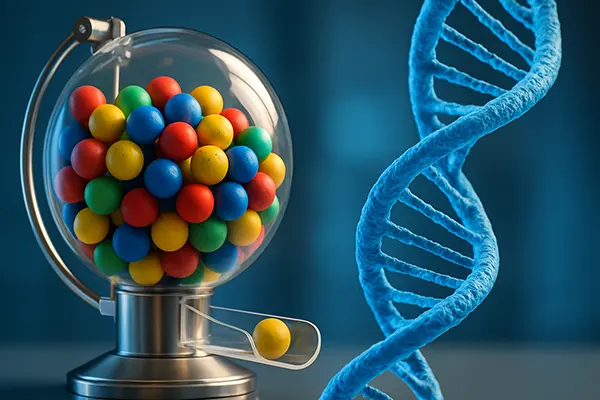
Bioethics and Genetic Lotteries: Is DNA-Based Fortune Fair?
In 2025, discussions around bioethics and genetics are no longer confined to academic halls. One of the most provocative concepts emerging from this discourse is the idea of “genetic lotteries”—programs or policies that reward or benefit individuals based on their genetic traits. With the rapid rise of personalised medicine and genetic profiling, the ethical boundaries between health equity, social justice, and biological determinism have become more blurred than ever.
The Concept of Genetic Lotteries in Bioethics and Insurance
The term “genetic lottery” originates in philosophical literature, especially in the context of moral luck. Philosophers like John Rawls and Thomas Nagel used it to describe the unchosen conditions of one’s birth, including social class and genetic makeup. In bioethics, this concept has taken on a new dimension, particularly in health insurance. Insurers and researchers debate whether it is ethical to vary premiums or allocate treatments based on genetic predispositions.
On one hand, genetic knowledge could help design more cost-efficient healthcare systems. On the other, it risks penalising individuals for conditions beyond their control. Countries like the United Kingdom and Germany have enacted genetic discrimination laws to restrict insurers’ access to such data, but loopholes and private agreements remain grey areas of concern.
Furthermore, with AI-driven genomics becoming mainstream, corporations are exploring incentives based on polygenic scores—indicators of an individual’s likelihood of developing certain conditions. These incentives can look like discounts, rewards, or even job prioritisation, triggering major ethical debates.
Hypothetical Scenarios: Rare Genotypes as Entry Tickets
Imagine a public or private lottery scheme where participants with rare or beneficial genetic traits—say, a resistance to Alzheimer’s or higher-than-average cognitive performance markers—are awarded significant financial prizes. While this might seem utopian or absurd, it mirrors early 2025 start-up experiments in Singapore and California, where biotech firms offered grants or scholarships to carriers of specific rare mutations to incentivise genetic research participation.
While marketed as science advancement, such initiatives can quickly devolve into selective bio-reward systems. These systems can create new social classes, favouring those born with “valuable” DNA. Moreover, rewarding rarity may deter collective health goals and breed resentment among those left out.
Some proponents argue that this approach aligns with meritocratic values—rewarding traits society deems beneficial. However, ethics panels worldwide, especially in Nordic countries, warn that biological meritocracy erodes the principles of equality and dignity.
Discrimination and the Risk of Genetic Inequality
Genetic discrimination is not a future threat—it’s already unfolding. A 2024 report by the European Bioethics Agency revealed that in at least five EU countries, employers indirectly accessed genetic risk indicators via wellness programmes and used them to inform hiring decisions. Although technically illegal, enforcement remains poor.
Marginalised groups may be particularly vulnerable. If someone’s genetic profile includes a higher likelihood of mental illness or addiction, they might face subtle forms of exclusion, especially in competitive industries like finance or tech. This undermines human rights and stigmatises individuals based on probabilistic data.
Moreover, parents with means might begin “optimising” offspring through legal embryo selection, creating future citizens born into privilege based not on wealth but on genome. It reshapes inequality in unprecedented ways—where genes become currency and societal worth is linked to invisible traits.
Data Privacy, Consent, and the Right to Ignorance
One of the most alarming aspects of genetic lotteries is data usage. Many people contribute genetic samples for health research, often unaware their data may be repurposed for commercial or promotional schemes. The 2025 EU Genomic Data Act aims to strengthen informed consent protocols, but gaps in private sector compliance remain.
Additionally, individuals may not want to know their full genetic risks. The right “not to know” is embedded in several bioethical frameworks. Forcing disclosure through lotteries or benefits coercively denies people autonomy over their biological identity.
Platforms collecting this data are increasingly targets for cyberattacks. In January 2025, a breach at a genomics firm in Israel exposed the private DNA profiles of over 2 million users, raising public distrust and igniting calls for biometric data protection as a human right.

Ethical Alternatives and Global Governance
There are paths forward. Experts in bioethics and international law suggest that if genetic incentives must exist, they should follow stringent ethical review, transparency, and equality safeguards. Some propose blind lotteries where eligibility is randomised, with DNA simply used for data aggregation post-selection to avoid bias.
Others call for a global moratorium on financial incentives linked to genetics until universal ethical frameworks are ratified. Organisations such as UNESCO and the WHO Bioethics Committee are actively developing models that can bridge cultural, legal, and moral boundaries in this domain.
Most promising are community-benefit models, where genetic studies return value not to individuals but to their local communities—through healthcare, education, or infrastructure. This promotes collective gain over individual reward, aligning closer with public health principles.
Bioethics Education and Public Discourse
Public understanding is critical. As genetic science outpaces regulation, people must be empowered to question and participate in policy formation. Bioethics education in schools and universities can build a generation that thinks critically about DNA, identity, and fairness.
Platforms for transparent debate—citizen panels, open data forums, and interdisciplinary think tanks—can ensure a diverse range of voices are heard. Ethical decisions cannot be left solely to scientists or politicians; they must include sociologists, disabled persons’ advocates, and marginalised communities.
Ultimately, fairness in the age of genomics depends on humanity’s willingness to think beyond the double helix—to value complexity, context, and conscience over cold calculations of biological luck.
